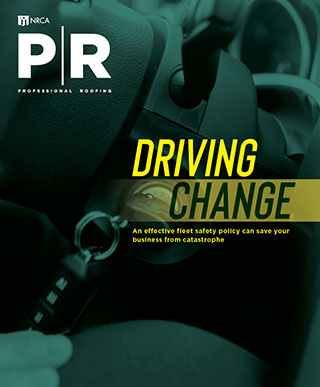
“The Good, the Bad and the Ugly”: Does this 1967 spaghetti Western movie conjure a haunting whistle in your ears? If no, I suggest finding a clip of it now. Most people are familiar with the melodic whistle even if they haven’t seen the film.
Similar to the mysterious loner played by Clint Eastwood in the film, the roofing industry moved quietly through the American landscape, doing the best it could, navigating challenges in a vast wilderness. Years ago, training in the roofing industry was sporadic and uncoordinated among organizations.
But then the unqualified workforce shortage arrived, and the industry realized it needed to coordinate educational and training programs to equip itself with qualified workers. Now, NRCA maintains a list of 62 U.S. affiliate organizations and 40 One Voice members—manufacturers, distributors and allied professionals—that provide a high level of educational service to the roofing industry in four broad categories: business practices and culture; workforce development; specific industry populations; and individuals.
Business practices and culture
Business practices and culture include a wide variety of topics. Most associations offer conferences and webinars aimed at enhancing their members’ business practices.
“As the educational arm of the Florida Roofing and Sheet Metal Contractors Association, the Educational and Research Foundation seeks to provide meaningful content to the industry,” says John Hellein, educational foundation director at FRSA. “The foundation develops courses about business practices, codes, legal and human relations, workers’ compensation, safety and general roofing topics. Many of these courses receive accreditation through the state of Florida and, in addition to industry knowledge, provide contractors with continuing education credits required to maintain their professional licenses.”
Programs such as NRCA’s Future Executives Institute place a premium on current and future leaders developing solid business practices. The three-year program focuses extensively on strategic planning as well as many other topics and is taught by industry and academic leaders. FEI aims to professionalize the industry by educating company leaders in all aspects of business building and helping them to connect with other leaders in the industry.
NRCA Legal, formerly known as the National Roofing Legal Resource Center, provides legal education for roofing contractors. And annual events such as the International Roofing Expo® help roofing professionals refine their skills and approaches to business.
More recently, vendors and consultants have entered the education space.
“We host virtual presentations such as the state of the union with attorney Trent Cotney from Cotney Consulting,” says Amanda Fields, executive director of Roofing Contractors Association of Washington. “We also are hosting a few classes about marketing and contractors’ rights, and we have some classes with manufacturers. We have an extensive YouTube library for roofing contractors to watch and learn.”
The need for business education and training has become more palpable in recent days with the increased use of subcontractors. Organizations such as RoofersCoffeeShop® are providing easily accessible resources.
“RoofersCoffeeShop was created to bring the industry together online,” says Heidi Ellsworth, partner with RoofersCoffeeShop. “Started in 2002, it is still the place where roofing professionals come together but with a stronger sense of ongoing training, thought leadership and continuing education.”
Manufacturers also have started going beyond their usual product and installation training by offering business development courses. Beacon Building Products, Herndon, Va., and GAF, Parsippany, N.J., have partnered to offer training for in-home selling, and CertainTeed LLC, Malvern, Pa., launched a series of business-building workshops within its contractors’ myEDGE™ program.
Safety is one business area that has seen dramatically ratcheted attention recently in terms of policies and procedures and developing company culture.
“The roofing industry has come a long way during my 42 years of working in the industry,” says Jim Brauner, owner of Brauner Safety Services, Saint Cloud, Fla. “During my travels, I am starting to see more and more team members wanting [safety] training. They want to keep themselves and the crew they are working with safe. They also want to stand out and be recognized.”
In 2023, NRCA debuted its Fall-protection Trainer Course for Roofing to keep pace with companies whose safety cultures are demanding ongoing in-house training designed to protect their people via improved training.
There also has been an increased focus on the mental health and well-being of people working within companies. This can be as broad as enhancing leadership skills and focusing on psychological safety to as specific as normalizing training to help employees recognize signs of depression, anxiety and suicidal thinking amongst their peers.
Kara McCaffrey is chief wellness officer at Houck Services Inc., Harrisburg, Pa., and spearheads many initiatives that focus on employee wellness. She helps educate employees about the aspects of well-being in a fast-paced, physically demanding environment.
Additionally, NRCA works with the Construction Industry Alliance for Suicide Prevention to provide resources to the industry.
A separate but related initiative within the business practices and culture category has been a focus on diversity, equity and inclusion. The National Women in Roofing’s REAL Roofing program provides an overview of the key DEI concepts essential in the management of personal, interpersonal, institutional and structural change.
Workforce development
Workforce development has two sectors: one focused on those already in the industry and the other targeted at those not yet in the industry.
In the industry
Workforce development within companies means focusing on current employees. Getting them in the door, hired and functioning in their roles is only the beginning. Keeping people and developing them into career employees takes significant effort, and systemic training is an essential element.
Beacon Building Products’ Ambition 2025 initiative was developed to invest heavily in new talent and retain new employees by effectively integrating them into the business. Other organizations, such as unions, focus on internal workforce development primarily through apprenticeship programs and manufacturer training.
“Our aim is to provide quality education and training for those entering or who have entered the roofing and waterproofing industry,” says Racheal Geyer, training manager for Pierce County Roofers, Tacoma, Wash.
A few years ago, NRCA partnered with the National Center for Construction Education and Research to develop a roofing curriculum suitable for use in apprenticeships, and it currently is being used in many Associated Builders and Contractors locations, as well as other organizations with structured apprenticeship programs.
Manufacturers also are expanding their reach in creative ways. For example, CertainTeed offers exterior products training. According to Senior Manager Joe Thompson, the company’s program provides credentials to individuals rather than companies and offers customized training via their fleet of mobile training vehicles.
As in-house installation training is improving across the industry, NRCA seeks to better equip contractors through its Training for Roof Application Careers programs—online roof system-based programs aimed at conversational competency for new and existing installers.
Not yet in the industry
Every sector of the roofing industry is concerned with creating a potential population from which to recruit. This requires engagement with high schools, career and technical education schools, corrections facilities, nonprofit organizations and others to recruit new workers. This issue is not new, but in recent years, efforts have increased to provide coordinated industry programs to reach these populations.
GAF, in collaboration with roofing contractors and other organizations such as corrections facilities, conducts multiday hands-on workshops around the U.S. and connects graduates with GAF contractor customers. During 2023, more than 700 new employees were placed through the program.
Through a unique collaboration among Cleveland-based Sherwin-Williams; National Women in Roofing; ATAS International Inc., Allentown, Pa.; and Roofers CoffeeShop, a metal roofing course has been developed for entry-level workers.
During the past few years, NRCA has aggressively spearheaded a collective industry initiative to add and secure roofing, which previously was not included, as a part of SkillsUSA’s TeamWorks competition. In addition, commercial roofing has been added as a standalone event. SkillsUSA champions skilled trades by encouraging CTE students across the U.S. to be trained and compete in school-based and regional competitions in their trade of choice, ultimately culminating in an annual national competition.
Specific populations
“Lane focus” relates to organizations working in the industry that have a specific purpose, or lane. These include National Women in Roofing, Cleveland-based Level Up Consultants, the Tile Roofing Industry Alliance and manufacturer-specific associations, among others. These organizations offer training about varied topics, but their mission is filtered through a specific lens.
National Women in Roofing considers what women in the roofing industry need within their career paths. Level Up Consultants provides resources to companies such as training tools to focus on the mental health of employees. And the Tile Roofing Industry Alliance offers manual certification as a means of assuring industry professionals know where to locate installation documents and encourages tile installation companies to use NRCA’s installation training programs and PROCertification® for credentialing.
Other organizations such as the EPDM Roofing Association focus on “proactive and intentional education efforts aimed at those who do not know much about EPDM, and proactive education aimed at policymakers regarding the benefits of holistic roof system design,” according to Executive Director Ellen Thorpe.
Latinos en Roofing is a relatively new organization that serves the nation’s Spanish-speaking contractors with business strategies and skills. NRCA recently entered a formal partnership with the organization, which currently has focused its efforts in Texas, to help expand its reach.
Individuals
The best leaders have figured out strengthening their companies means strengthening their employees not just as a group but also by focusing on individual needs.
Career paths; training focused on individuals’ skill gaps; and ongoing, intentional conversations with individuals are becoming more common.
Discussions about mental health may not have a place in a roofing company. However, Mandy McIntyre, owner and president of Level Up Consultants, explains “this is about empowering people to be their best selves and to thrive personally and professionally. If we want people to perform well, they have to feel well, and that goes beyond their physical health.” She believes the well-being of individuals is integral to the success and sustainability of the roofing industry.
NRCA University believes leadership is key to a well functioning workplace and a driver to increased productivity. Foreman leadership training and FEI rest upon the foundational concept that helping individuals to focus on and improve themselves is the lynchpin to becoming more effective in their roles.
The good, the better and the best
This article is far from an exhaustive list of all the good work being done in the roofing industry. There are many other great training stories being told across the U.S.; this is but a broad look at the efforts from various sectors.
When looking for great training, roofing contractors no longer need to hear the haunting whistle of “The Good, the Bad and the Ugly” and squint across a vast horizon. There now are many educational resources to choose from in a variety of topics and categories to suit the needs of any company or employee
AMY STASKA is vice president of NRCA University.



